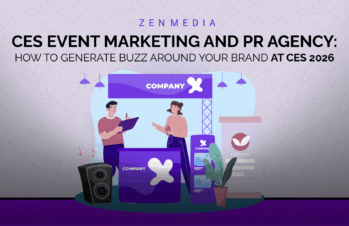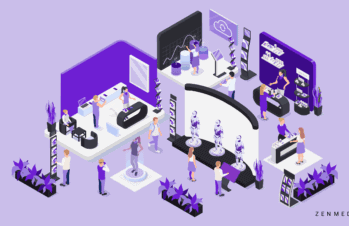The event space has changed dramatically over the last two years. The B2B exhibit industry cancellation rate in Q4 of 2020 was 97.9%. In Q4 of 2021, only 12.5% canceled their events. We’re ready for live events. The hunger is there.
But do you need an event planner or an event marketer? Which will give you the biggest R.O.I.? Let’s break it down.
Event Planning vs. Event Marketing
Event planners can handle anything you throw their way. Their job is to ensure that the attendee experience is outstanding and aligned with the company’s goal for the event. Think about wedding planners: They can plan the best wedding ever, but they can’t convince the guests to attend. The guests have to want to come.
And that’s where event marketing steps in. B2B event marketing is about attracting the right audience and aligning with business goals.
Event Planning
When it comes to the ins and outs of event planning, it involves creating, coordinating, and managing different parts of an event. They are the people that walk around the event with a clipboard, a walkie-talkie, or a headset and run around to make sure everything runs smoothly. They do everything from reserving a location to hiring caterers, negotiating contracts with vendors, creating a schedule, and troubleshooting onsight problems.
But after your event is over, so is an event planner’s job. They are there during, but not after the dust has settled.
Event Marketing
Event marketing is like event planning in that it also involves planning, organizing, and executing an event, but they do it to promote a brand, a service, or a product. Essentially, event marketing is everything that is done before the clipboard comes out—and what’s done after it’s put away.
Events can take place in-person, online, or as a hybrid, and companies can host the event, participate as a sponsor, or attend as an exhibitor.
An event marketer creates a well-thought-out promotional strategy to tell your brand’s story and spread the word about the event.
The result for event marketing isn’t just getting attendance; it’s generating leads and converting prospects into new customers. It’s not just about getting people there—it’s also about interacting with them before and after the event.
A few parts of event marketing can include setting goals for the event, creating a marketing timeline, planning for website optimization (like B2B SEO), defining a target audience, creating content and promotional materials, developing social media campaigns, handling B2B email marketing, scheduling onsite event marketing, and planning post-event marketing.
But why do you need someone to handle your event marketing besides what’s mentioned above?
Related Reading: How To Successfully Promote Pre- and Post-Event
Generate business.
This may seem obvious, but companies choose to invest in event marketing because events generate new business and revenue opportunities. In fact, 95% of marketers believe in-person events can significantly impact achieving business goals.
When you host an event, the registration process generates a list of people who are already interested either in your product, industry, or fall in your target demographic.
Provide one-on-one engagement.
Let’s face it: Our world is becoming increasingly digitally focused. Smartphones, email, and web3.0 make it easier to live behind a screen—and less likely for B2Bs to meet their customers or clients in person.
That’s where event marketing stands out.
In-person events provide attendees the opportunity to form connections—not just with each other but with the business/brand itself. Engaging with customers and potential customers at events creates personal interactions. And these personal, one-on-one convos can build brand loyalty and help customers humanize your brand. With the proper event marketing, you can capture a customer’s attention better than over the phone or an email pitch.
In-person attention means you can get their undivided—okay, less divided than usual—attention and have a chance to sell or upsell your services and products.
Related Reading: Hybrid, Physical, or Virtual: What Should Your Event Be?
Build brand awareness.
A fundamental way for your company to establish and grow your brand is to host or participate in an event. In fact, about 64% of event marketers list brand awareness as the primary reason for hosting them.
An event marketer can bring your otherwise digital brand to life and allow attendees to associate your B2B with a physical identity and aesthetic experience. With event marketing, you can provide an immersive experience so potential customers can get a feel for your brand.
The best part about building brand awareness is word of mouth. People talk about events, whether they be potential customers, media, or influencers. They talk in person, on social media, in the press. And marketing your event is a great way to educate people about your brand and services.
What makes event marketing so successful is that it doesn’t focus solely on a brand or product; there’s typically an educational component that entertains a demographic or industry while promoting products and services on the side—and that makes for great marketing across the board.
Related Reading: Event Marketing: Past, Present, and Future
How do you make the final call?
Your business and its success are crucial to you; we get that. So how do you decide whether to go with an event planner or event marketer?
Determine the goals of your event.
First off, figure out what kind of event you want to host. Suppose you want to throw a smaller event like a happy hour, office party, or client appreciation event. In that case, you may only need an event planner to handle tasks like booking locations and decorating. For larger-scale events, an event marketer is the ideal choice.
Figure out your needs.
Once you’ve figured out your company’s goals and objectives for the event, highlight goals your company hopes to accomplish. Are you hoping to have a successful event and move on? Are you hoping to use this event as a springboard for more communication with prospects?
While both event planning and marketing are beneficial to your event, event marketing offers the biggest return on investment. About 86% of B2B organizations get a positive ROI of their events after seven months of the event date. In other words, it pays to keep marketing your brand before, during, and after your event.
Want to take your event marketing to the next level? Reach out.




